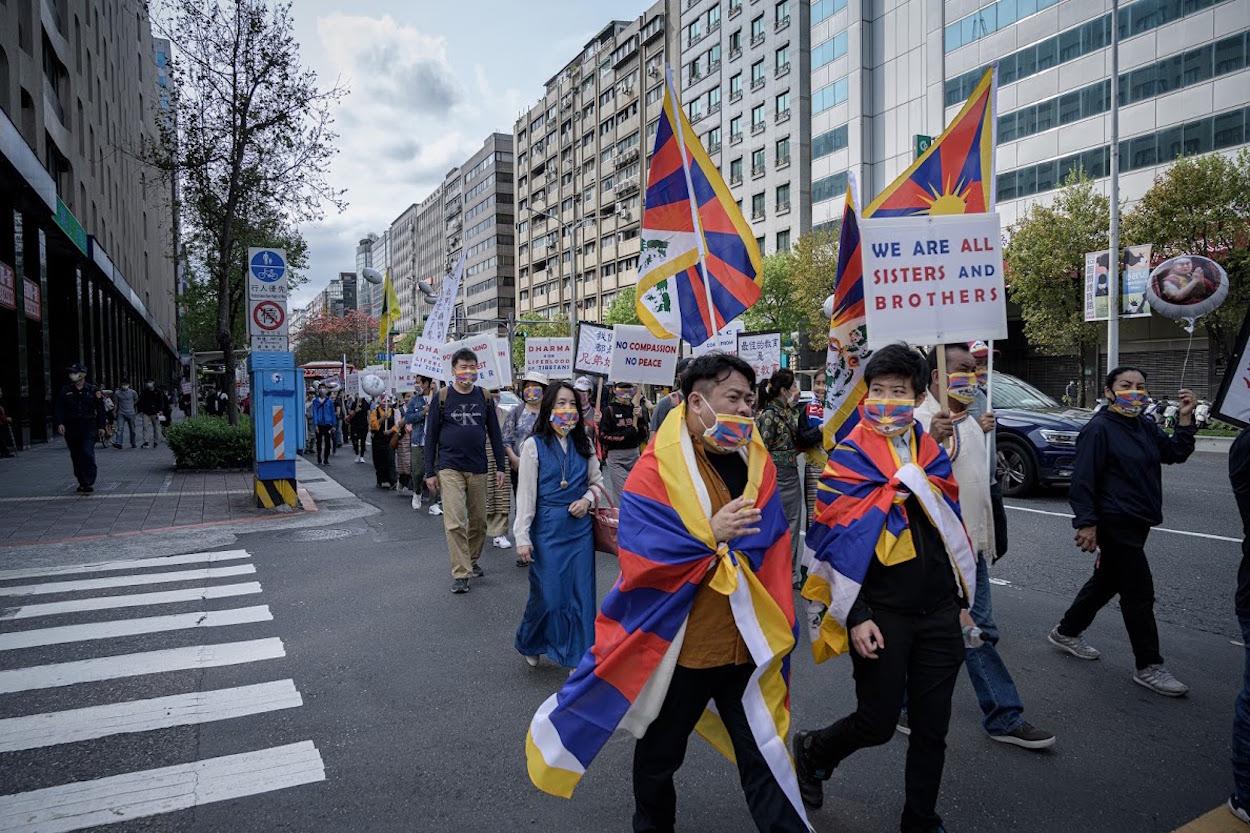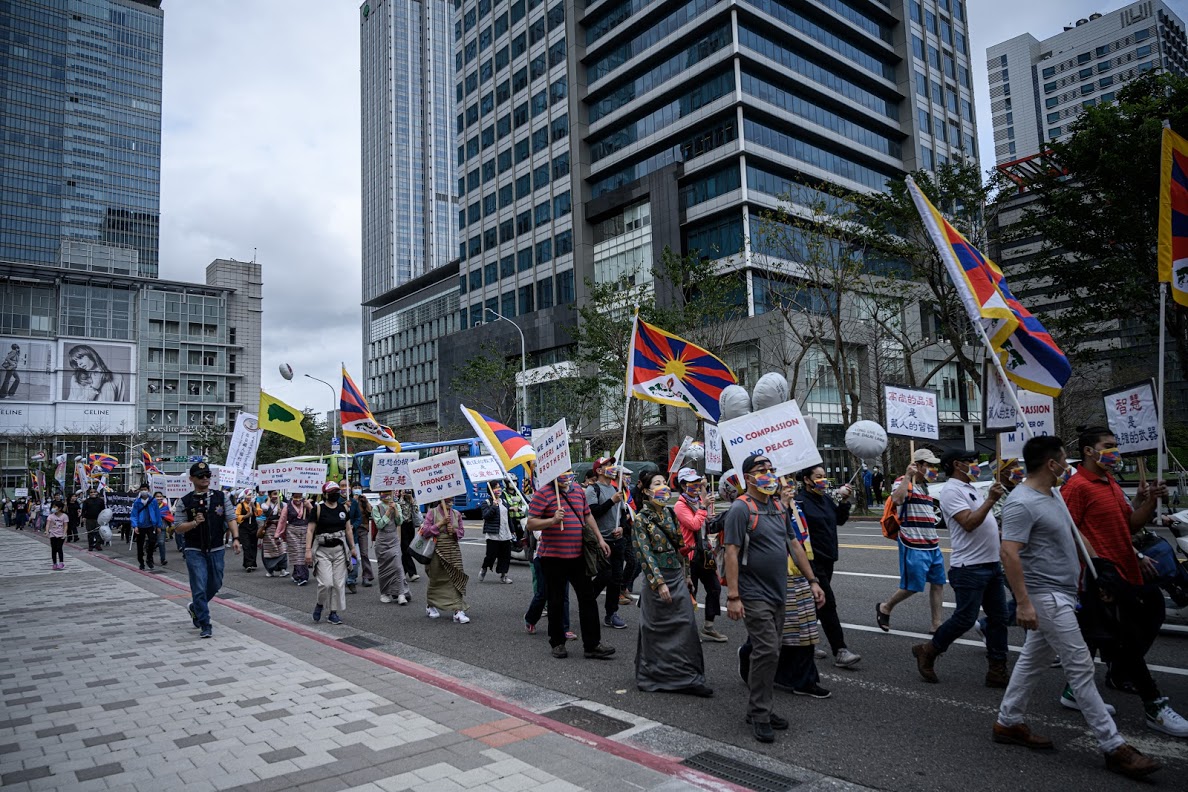by Brian Hioe
語言:
English
Photo Credit: Taiwan Tibetan Welfare Association 在台藏人福利協會/Facebook
THE ANNUAL commemoration of Tibetan Uprising Day took place on Sunday in Taipei, taking place two days ahead of the actual anniversary of Tibetan Uprising Day today. As in past years, the demonstration began in front of the Sogo department store located by the Zhongxiao Fuxing MRT station and proceeded through the city to Taipei 101.
The march commemorated the 61st anniversary of Tibetan Uprising Day, which took place on March 10th, 1959, and was a failed uprising against Chinese military forces occupying Tibet. As in past years, participant groups included a number of groups active in Tibet advocacy work, such as the Taiwan Tibetan Association, the Human Rights Network for Taiwan and Tibet, and the Taiwan Tibetan Welfare Association. Approximately one hundred were in attendance.
 Photo credit: Taiwan Tibetan Welfare Association 在台藏人福利協會/Facebook
Photo credit: Taiwan Tibetan Welfare Association 在台藏人福利協會/Facebook
The march took place as a silent event, given concerns regarding the ongoing COVID-19 coronavirus epidemic. Participants in the demonstration wore medical masks and mask covers with the Tibetan flag printed on it were distributed among demonstrators.
Before the march began, Tibetan monks chanted religious chants and the Tibetan national anthem was sung. A moment of silence was also held for individuals who had died in the course of the COVID-19 epidemic, with speakers criticizing the CCP, and citing solidarity for Chinese affected by the coronavirus outbreak, in particular residents of Wuhan. In speeches, Tibetan representatives called for the safety of the Tibetan people, as well as for Tibetans to be allowed religious and cultural freedoms.
Among those present at the demonstration included independent legislator Freddy Lim, legislators Fan Yun, Hung Sheng-han, and Wu Yu-qin of the DPP, and Taipei city councilor Miao Poya of the SDP. Lim, in particular, has a long history of advocacy for Tibetans, including issuing a public invitation for the Dalai Lama to visit Taiwan, something that it was hoped would pressure the Tsai administration in allowing for such a visit.
Tsai met with the Dalai Lama in 2009, but it is probable that the Tsai administration is hesitant that a visit by the Dalai Lama to Taiwan could prove provocative of the Chinese government. Tsai and her administration have come under fire from members of the pan-Green camp for not taking a more proactive stance in inviting the Dalai Lama to Taiwan in the past.
Notably, yesterday’s demonstration was preceded one month prior by a February 12th press conference held by young politicians with a background in activism that were newly elected legislators. This included not only Lim, Hung, but also Handy Chiu of the NPP and Chen Bo-wei of the TSP. This was followed by a February 19th press conference held by Taipei city councilors with a background in activism, including Miao Poya, Meredith Huang and Sabrina Lim of the NPP, Wu Pei-yi of the DPP, and independent Froggy Chiu.
At both events, speakers were critical of the KMT’s advocacy of signing a peace agreement with China, something that it is feared could be used as a means by the KMT of eroding away at Taiwan’s political freedoms, and claims by the KMT that it intends to reorient away from China and toward America instead. Speakers, notably Miao Poya, criticized Taipei mayor Ko Wen-je for making light of Tibetan self-immolations, as observed in past statements by Ko that Tibetan self-immolations created “trouble” for the Chinese government.
 Photo credit: Taiwan Tibetan Welfare Association 在台藏人福利協會/Facebook
Photo credit: Taiwan Tibetan Welfare Association 在台藏人福利協會/Facebook
Speakers also suggested that the Taiwanese government should do more for Tibetans in Taiwan, seeing as Tibetans who are members of the Tibetan exile community in India may not have passports but only Identity Certificates (ICs), something which only allows them to visit Taiwan to study, visit relatives, attend conferences, or seek medical treatment. The suggestion was made to consider Tibetans as a target of the New Southbound Policy by Lin Hsinyi, the director of the Human Rights Network for Taiwan and Tibet.
While commemorations of Tibetan Uprising Day take place annually in Taiwan, usually drawing members of the pan-Green camp as attendees, it remains to be seen what measures can pressure the Tsai administration into taking further actions to aid Tibetans in Taiwan. The Tsai administration has been reluctant to take steps that might be perceived as provoking the Chinese government and it has been afraid of being perceived as deliberately aiding Hongkongers in relation to the protests which have rocked Hong Kong for the past year. But it is to be seen whether the Tsai administration will be more willing to take concrete action to help Tibetans in the wake of its 2020 election victory.

